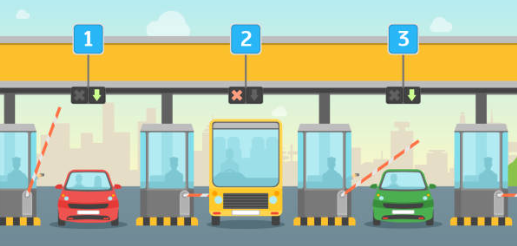A major element of the 2004 Budget presented recently by President Olusegun Obasanjo to the National Assembly was the decision to wind up the operation of toll gates on major highways across the nation. That came into effect on the 1″ day of January 2004.
Over the years, the tollgates had proved to be very fecund ‘milch cows’ on Nigerian roads that were milked by the individuals appointed to run them by succeeding governments, to line the pockets of individuals in and out of government.
The original purpose for which they were established was lofty enough; it was to ensure that road users paid a certain amount of money into the coffers of government in order to ensure a reasonable level of revenue that can be drawn upon for the regular maintenance of these roads. It is a practice that has succeeded very well in other parts of the world.
However in Nigeria, the tollgates became part of the largesse that were farmed out to individuals close to the higher echelons of government during the military dictatorships of our recent past, and to party supporters with the return to civilian rule in 1999.
The result was that monies collected, in the main, went to serve the interests of these individuals, while a paltry percentage went to the government.
Nigerians therefore faced a double jeopardy: the reason of maintenance that ostensibly was the reason for the daily collection of tolls from them each time they travelled on these highways was never fulfilled.
Similarly, the billions of Naira budgeted each year for roads construction and maintenance also did not improve the condition on our roads. It was an exasperated President Olusegun Obasanjo, after expending over N300 billion on these roads, that confessed his shame about the state of Nigerian roads, last year!
There is however, a human element to the saga of Nigerian tollgates that seemed to have escaped the governmental authorities which took the decision to remove them at the beginning of the new year. That is the active economic life that these tollgates have generated over the years all over Nigeria. Any traveller would readily recall the vendors of food items, newspapers, ‘pure water’, even fried snails crowding around these tollgates. They have been able to generate an economic life in a truly depressed economy, where jobs in the formal sectors of the economy have continued to disappear, year in year out, especially since 1985, when the military dictatorship of General Babangida decided to implement the Structural Adjustment Programme of the Breton Woods Institutions.
The economic life around the toll gates, although unquantifiable from the perspective of orthodox economics, nevertheless has kept these individuals and their families afloat in the cruel circumstances that the official neoliberal economic order has generated in our country.
By removing the tollgates, this very significant economic structure will also, like humpty dumpty, come crashing down into pieces, thus deepening the problems associated with the livelihood of majority of the Nigerian people as the country entrenches the heartless regime of a Washington-inspired capitalist reforms, which President Obasanjo has vowed to pursue relentlessly in the new year, along with his economic team of doctrinaire, right wing experts.
Our fear is that the destruction of the tollgates economy is bound to increase the population of the underclass that will be drawn away from a legitimate pursuit of a livelihood in the parallel economy, to a life of crime and brigandage. When all is said and done, it is the nation that becomes poorer for polices that are not properly thought through before being inflicted on the country.
The removal of the tollgates, unwittingly, has shown the interconnectedness in the phenomena of life which the complexities of modern life often reveal, but which might not be properly apprehended by government officials responsible for taking decisions that impact upon the lives of the majority of the Nigerian people, especially when such officials are shielded from the harsh realities of existence, by their own privileges.
If there is a great need for officialdom to move closer to the lives of the people they legislate upon and rule over, the destruction of the economics of the tollgates, provides a vivid reminder.


